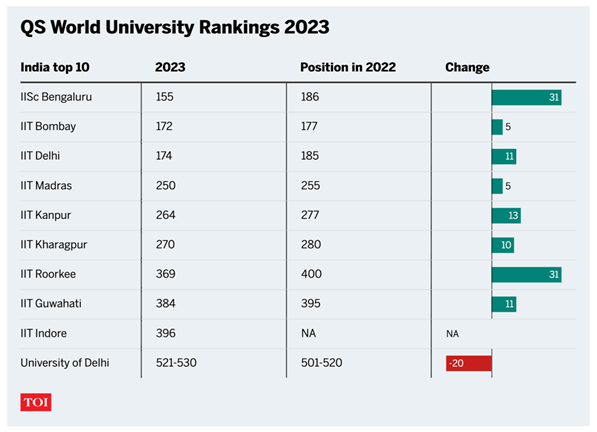In News:
- The Indian Institute of Science (IISc), Bengaluru, is the fastest rising South Asian university among the coveted QS World University Rankings top 200 varsities.
What’s in today’s article:
- About QS Rankings (Purpose, Parameters, etc.)
- QS Rankings 2023 (Major Highlights)
In Focus: QS World University Rankings
- Quacquarelli Symonds (QS) is a London-based global higher education analyst.
- QS World University Rankings is an annual publication of university rankings.
Purpose
- The rankings compare universities in four major areas: Research, Teaching, Employability, and International outlook.
- Each of these areas are measured against six performance indicators:
- Academic Reputation (40%):
- Based on an academic survey, it collates the expert opinions of more than 94,000 experts regarding teaching and research quality.
- Faculty/Student Ratio (20%):
- The number of academic staff employed relative to the number of students enrolled.
- Citations per faculty (20%):
- The total number of citations received by all papers produced by an institution across a five-year period by the number of faculty members at that institution.
- Employer Reputation (10%):
- Based on an employer survey, which collates responses from employers about which institutions they source the most competent, innovative, effective graduates from.
- International faculty/student ratio (5% each):
- A measure of an institution’s success in attracting faculty and students from overseas.
QS World University Rankings 2023:

- Quacquarelli Symonds (QS) recently published the 19th edition of the world's most consulted international university ranking.
- This year's QS World University Rankings is the largest ever, with 1,418 institutions across one hundred locations.
- IISc-Bengaluru is now the ‘fastest rising’ South Asian University, inching closer to the global top 150, having attained 155th rank in this year’s rankings.
- It remains the world’s top research university, ahead of Harvard, Princeton and MIT.
- IITs in Guwahati (37th) and Roorkee (47th) and new entrant University of Madras (48th) also made it to the elite list of global top 50 research institutions.
- Globally, the top five – MIT, Cambridge, Stanford, Oxford and Harvard (in order) – from last year remain unchanged.









